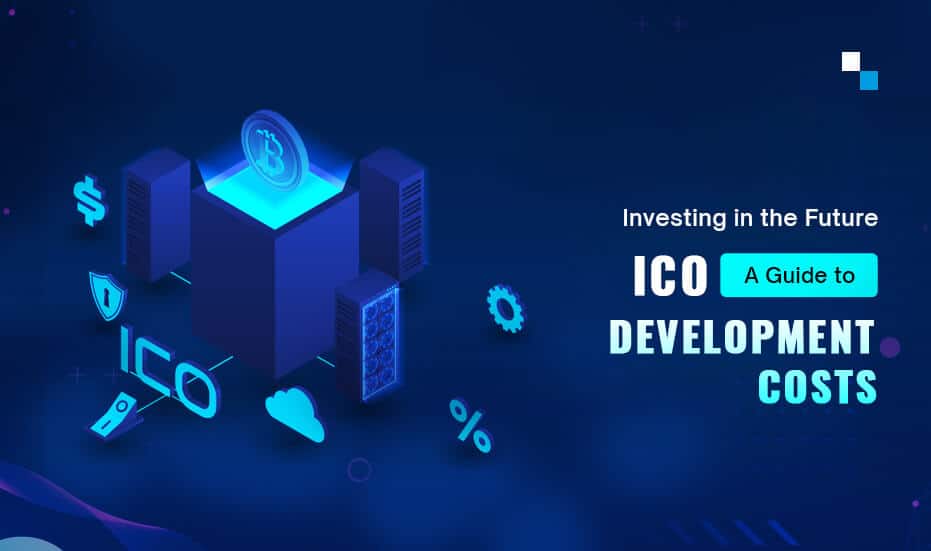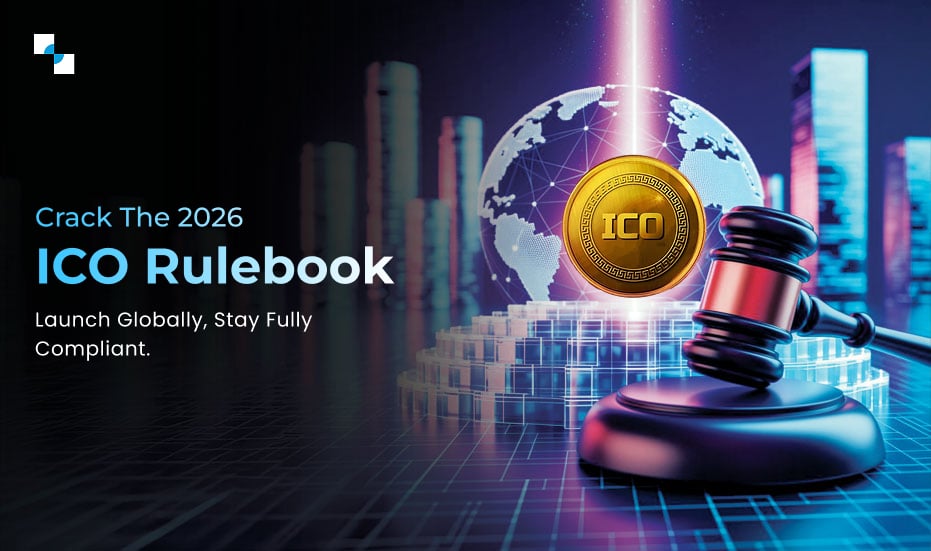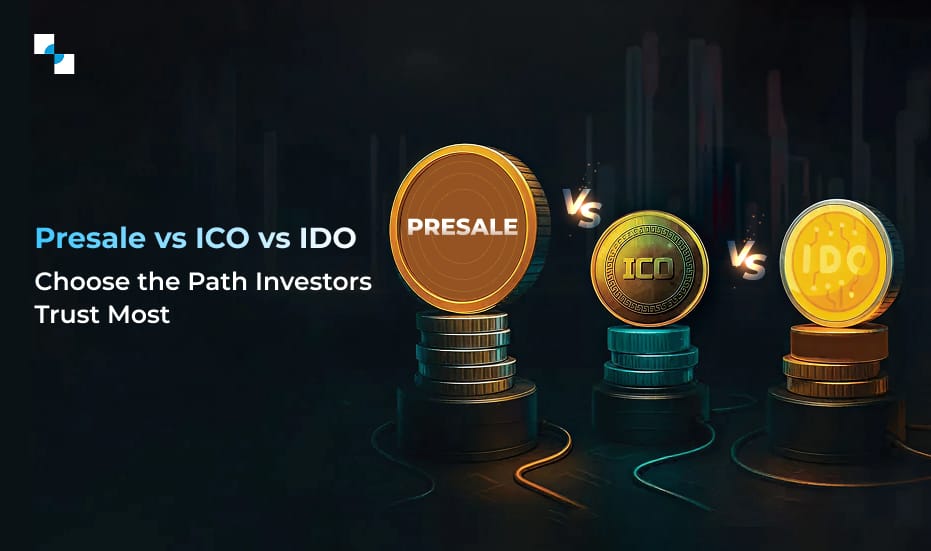Initial Coin Offerings (ICOs) have revolutionized the way businesses and startups raise capital in the digital age. An ICO is a crowdfunding method that allows organizations to issue and distribute their own digital tokens or coins in exchange for investments from the public. These tokens typically run on blockchain platforms, such as Polygon and Ethereum, and offer various utilities or benefits within their respective ecosystems.
ICO development refers to the process of creating and launching a successful Initial Coin Offering. It involves a range of crucial steps, including conceptualization, token design, smart contract development, marketing, and compliance. The ICO development services help meet the goal of attracting investors and raising funds for the project’s development while providing value and incentives to token holders.
How Does an ICO Work?
An Initial Coin Offering (ICO) is a fundraising method used by organizations, typically startups or blockchain-based projects, to raise capital by issuing and selling their own digital tokens or coins to the public.
The process of how an ICO development works generally involves the following steps:
1. Conceptualization
The organization or project team develops a concept for their venture, outlining its purpose, objectives, and how it will utilize blockchain technology and tokens to provide value.
2. Whitepaper Creation
A whitepaper is drafted with the help of ICO development services, which serves as a detailed document explaining the project’s vision, technical aspects, tokenomics (token economy), use cases, and roadmap. The whitepaper helps potential investors understand the project and its potential.
3. Token Design
The project team defines the characteristics of the tokens they will issue, such as the token name, supply, distribution model, and utility within the project ecosystem. Tokens can represent various things, including digital assets, access to services, voting rights, or revenue-sharing mechanisms. It can be done under the expert guidance of an ICO development company.
4. Smart Contract Development
Smart contracts are self-executing pieces of code that run on a blockchain platform and are created to govern the issuance, distribution, and functionality of the tokens. Deployment of smart contracts ensures transparency & security and automates certain processes, such as token distribution and management.
5. Pre-ICO Preparation
The ICO development team may decide to hold a pre-ICO phase, also known as a private sale or presale, where they offer tokens to a select group of investors before the public sale. This helps raise initial funds and generate interest in the project.
6. Announcement of Public ICO
The project team announces the launch of the ICO, including the start and end dates, token sale details, and how potential investors can participate.
7. Marketing and Promotion
Extensive marketing efforts are undertaken to create awareness about the ICO, attract potential investors, and build a community around the project. This can include social media campaigns, content creation, events, partnerships, and PR activities.
8. Token Sale
During the token sale period, interested investors can purchase the project’s tokens using cryptocurrencies, such as Bitcoin (BTC) or Ethereum (ETH), or sometimes even with fiat currencies. The project sets a specific token price or a pricing mechanism for the sale.
9. Token Distribution
Once the ICO concludes, the project team distributes the purchased tokens to the investors’ respective wallets. This is typically done automatically through the smart contract, ensuring transparency and accuracy.
10. Post-ICO Activities
After the ICO, the ICO development services focus on executing their roadmap, developing the project, and delivering on the promises outlined in the whitepaper. They engage with the token holders, provide regular updates, and work towards achieving the project’s milestones.
Want to Achieve fundraising goals and project objectives?
Schedule Free DemoCost Estimation of ICO Development
There are different factors to be considered while estimating the cost of ICO development. The exact cost may vary depending on the project’s complexity, team size, and specific requirements.
Here are some key aspects to consider when estimating the cost of ICO development:
1. Technical Complexity
This includes the creation of smart contracts, token creation, blockchain integration, wallet development, and other technical aspects. The complexity of these components will impact the development cost.
2. Choosing The ICO development company
A technical expert will charge a fee for assisting at each step of the ICO launch, including tokenomics, business strategy, and project management. It also depends on the team size and the complexity of the ICO project.
3. Website Launch
It is necessary to seek the help of ICO development services for the development of a user-friendly website, with an intuitive design. The cost will depend on the complexity of the website and the involvement of designers and developers.
4. Security Measures
Implementing robust security measures is a crucial step for protecting the ICO from potential threats and vulnerabilities. Costs may include security audits, penetration testing, and ensuring compliance with best security practices.
5. Marketing and PR
Building awareness and promoting the ICO is critical for its success. Costs can include marketing campaigns, social media management, content creation, PR activities, influencer partnerships, and community engagement.
6. Legal and Compliance
It is necessary to ensure compliance with applicable regulations, such as securities laws and data protection regulations. ICO development costs may include legal advice, regulatory compliance assessments, and drafting necessary legal documents.
7. Team and Talent
It’s crucial to build a skilled and experienced team to manage and execute the ICO development process. Development costs include salaries, contractor fees, or outsourcing expenses for developers, designers, marketers, and other professionals.
8. Ongoing Support and Maintenance
After the ICO, ongoing support and maintenance may be required, including addressing technical issues, community management, and further development. These costs should be considered for the post-ICO phase.
Examples of Initial Coin Offerings
Here are the top examples of Initial Coin Offerings:
- Ethereum’s ICO is a well-known example of an initial coin offering that was initiated in 2014. In 42 days, the Ethereum ICO raised $18 million.
- In 2015, a startup called Antshares, which later changed its name to Neo, launched a two-phase ICO. This initial coin offering’s first phase ended in October 2015, while the second ran until September 2016. Neo generated around $4.5 million throughout this time.
- Dragon Coin raised roughly $320 million during an ICO that lasted one month and ended in March 2018.
- The EOS platform’s creator raised an astounding $4 billion in 2018 through an ICO that lasted a full year.
Why Choosing An Efficient ICO Development Company is Important?
The landscape of ICO launch is dynamic and ever-evolving, influenced by technological advancements, regulatory frameworks, and market trends. As a result, it is essential for businesses and entrepreneurs to understand the intricacies and costs associated with ICO launch to make informed decisions and maximize their chances of success.
In this context, factors such as tokenomics, legal compliance, security measures, marketing strategies, and community engagement play vital roles. Choosing the right ICO development company can help in proper planning, having access to a solid development team, and a having compelling project vision. All these factors are crucial for creating an ICO that resonates with investors and gains traction in the market.
Wrapping Up
Estimating the cost of ICO development involves considering multiple factors and components that contribute to the overall expenses. The technical development of smart contracts, token creation, and blockchain integration, along with website design, security measures, marketing efforts, legal compliance, and ongoing support, all play crucial roles in determining the cost of launching an ICO.
It is important for organizations to carefully choose a seasoned ICO development company that can assess their project’s requirements and engage with experienced professionals. There can be no better choice than Antier, the ace ICO development services provider that can assist in planning and budgeting, resource allocation, and ensuring a successful ICO launch.







